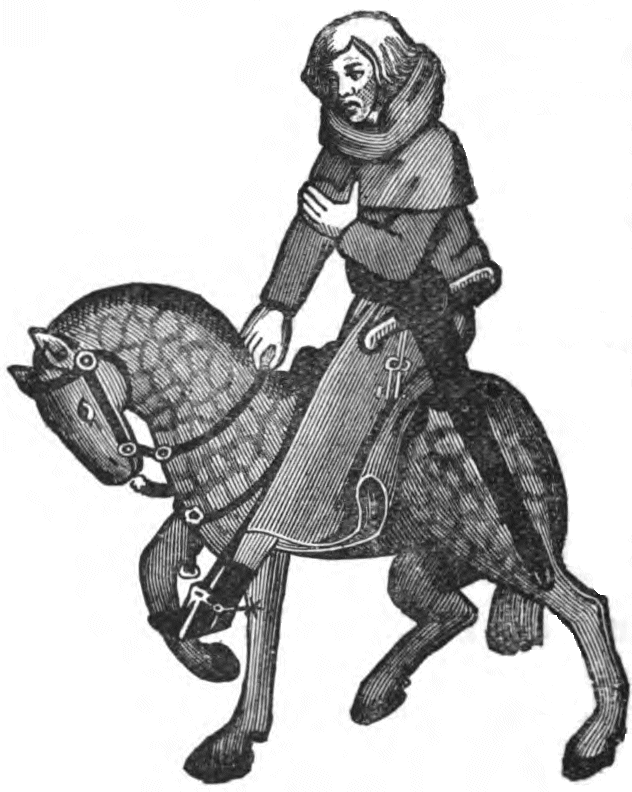

THE REEVE
It is fortunate that Chaucer's sketch of the Reeve presents no difficulties, as materials for illustrating it are unusually scanty. Except from the accounts of Robert Oldham, the bailiff of Cuxham in Roger's Agriculture and Prices in England (Vo1. I.) there is little to be gleaned. In noting that Oldham was a serf of the manor, Prof. Skeat adds "as reeves always were"; but the Oldhams lived before the Black Death, in which the whole family perished, and it seems improbable that Chaucer's Reeve, who belongs to a period some forty years later, was a serf. The Ellesmere picture shows the Reeve wearing a blue coat, with a red hood and red stockings. From the Talks by the Road, in which he fell foul of the Miller for bringing a member of his old craft of carpentry into ridicule, we learn that his name was Oswald. It is perhaps noteworthy that Chaucer makes him come from one of the eastern counties, with which his own family had connexion, and further localises him as belonging to a small place like Baldeswell.
587. colerik. See note on sangwyn, 1. 333.
590. His tope was doked, etc., his hair was cut short at the front of his head. The allusion is not to a priest's tonsure, but to his hair being kept short.
594. on him wynne, get the better of him.
602. brynge hym In arrerage, whatever money he had to receive on his lord's behalf he always collected it in good time.
603. There nas baillif, etc. ‘Bailiff' and 'reeve' are usually treated as exchangeable terms for the same office. If the Reeve had one or more bailiffs under him they must have had the management of separate farms, while he was bailiff of the whole manor. It does not seem probable that a bailiff of another estate altogether would have stood in such terror of Oswald.
606. His wonyng, etc. It is perhaps not fanciful to think that the mention of the Reeve's prettily-situated house just here was caused by the thought of herdsmen and labourers coming to him with their accounts, all the more afraid of him because he lived in a good house. Then we have the usual suggestion how he came to be so well off. Like the Merchant, Lawyer, Shipman, Cook, Miller, and Manciple, the Reeve made dishonest profits. The imputations become almost monotonous.
615. stot, a low-bred undersized horse.
616. Scot, said in Bell's edition of Chaucer to be still a Norfolk name for a horse.
620. a toun men clepen Baldeswelle. Bakleswell, or Bawdeswell, is part of the hundred of Eynford in Norfolk. [According to Blomfield's History of Norfolk (Vo1. VIII.), with the neighbouring manor of Foxley, it passed, 13 Richard II., on the death of John de Hastings, Earl of Pembroke, to Reginald, Lord Grey, of Ruthyn.]
621. Tukked, i.e. with his long coat shortened by being hitched up and kept so by a girdle.
622. And ever he rood the hyndreste, etc., probably rather from unsociability than, as has been suggested, because his horse was a bad one.
--o--
These notes are reproduced verbatim from Alfred W. Pollard, Chaucer's Canterbury Tales: The Prologue, London: Macmillan, 1903. The book is in the public domain and available for viewing and download from Google Books. Although the book is old, the notes are enlightening and accurate. Nevertheless, users doing detailed research on aspects of the General Prologue should, if possible, also consult more recent notes in print publications such as The Riverside Chaucer, ed. Larry D. Benson, 3rd ed., Boston: Houghton Mifflin, 1987.